人教版高中英语选修八Unit 3 inventors and inventions P3 Grammar 过去分词课件(共37张PPT)
文档属性
| 名称 | 人教版高中英语选修八Unit 3 inventors and inventions P3 Grammar 过去分词课件(共37张PPT) | 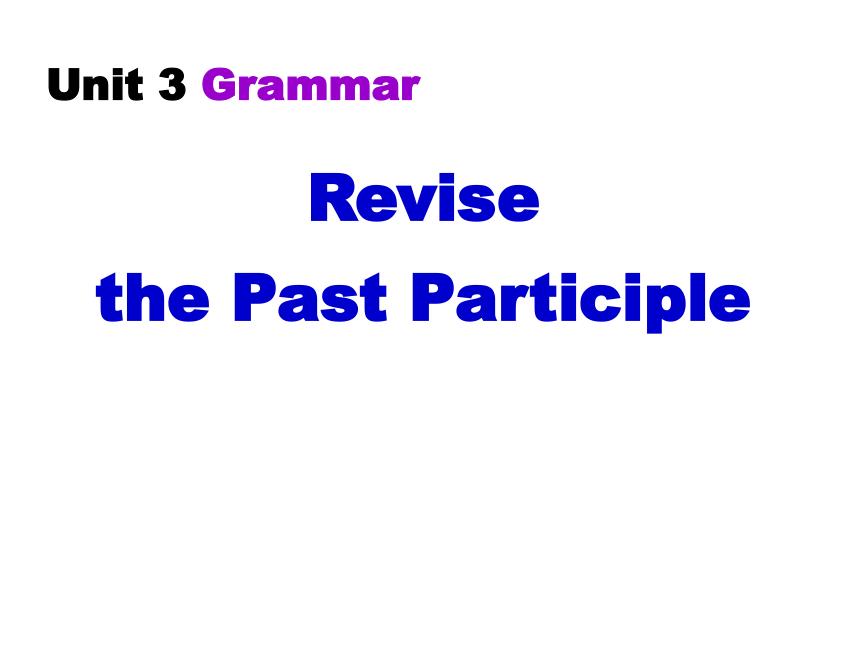 | |
| 格式 | zip | ||
| 文件大小 | 211.5KB | ||
| 资源类型 | 教案 | ||
| 版本资源 | 人教版(新课程标准) | ||
| 科目 | 英语 | ||
| 更新时间 | 2016-10-23 17:27:00 | ||
图片预览

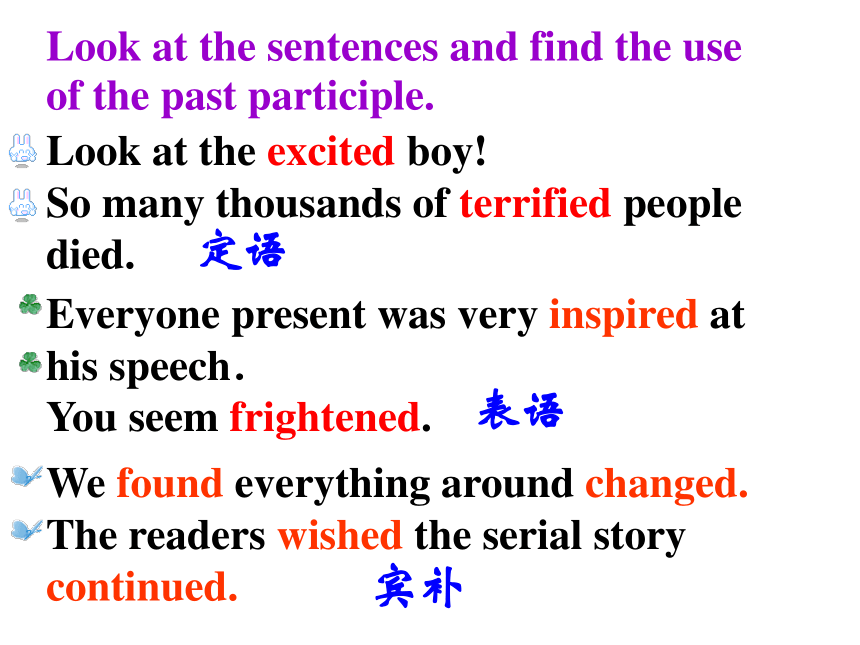

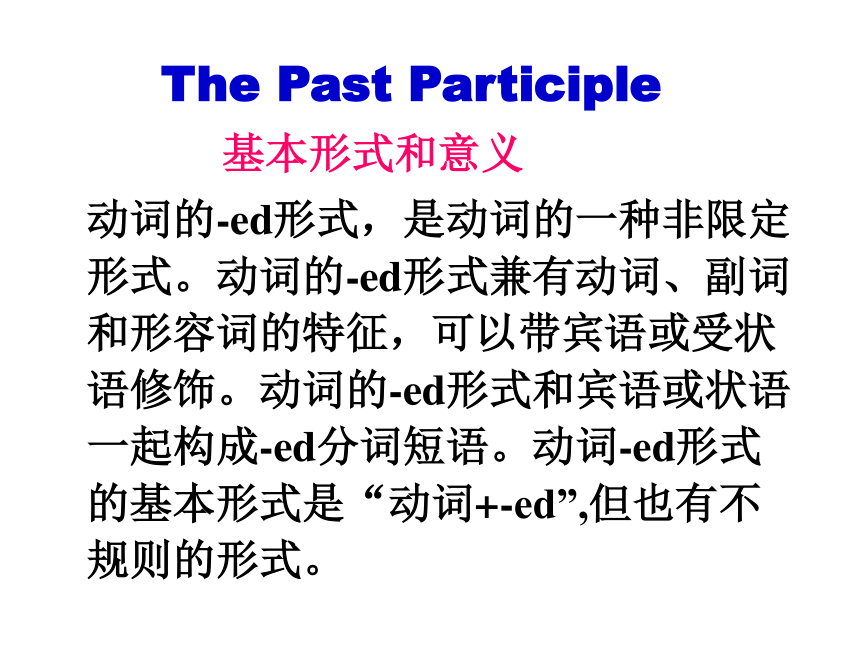



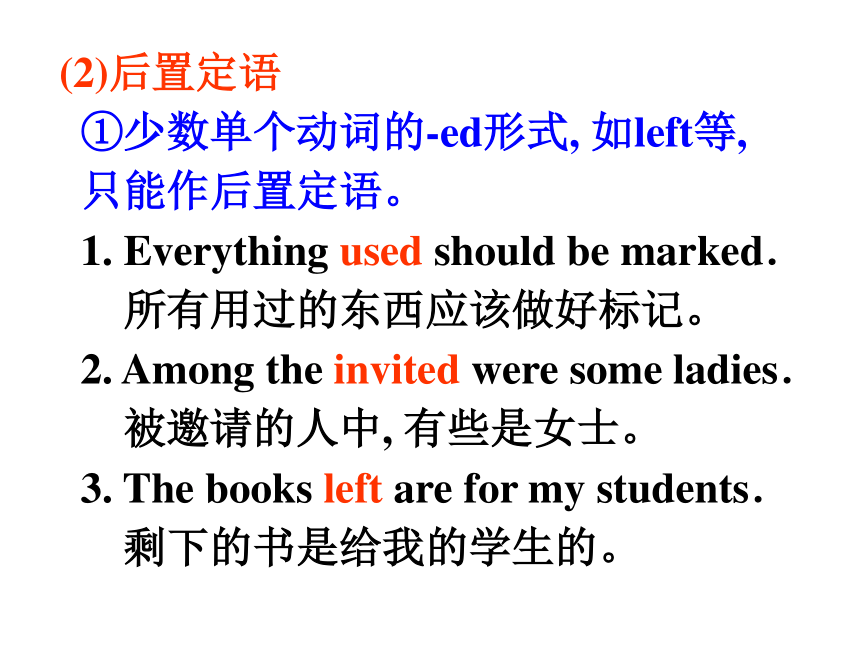
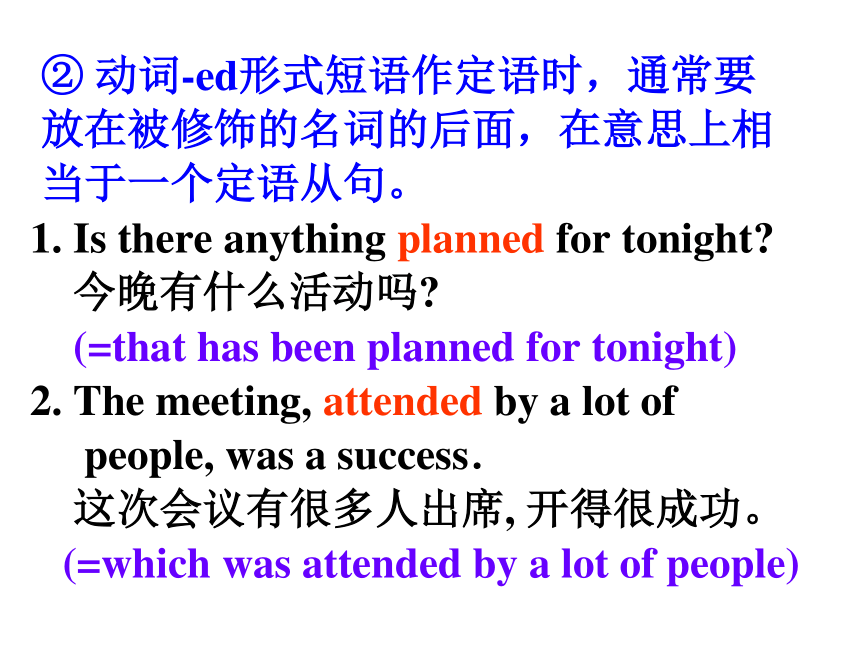
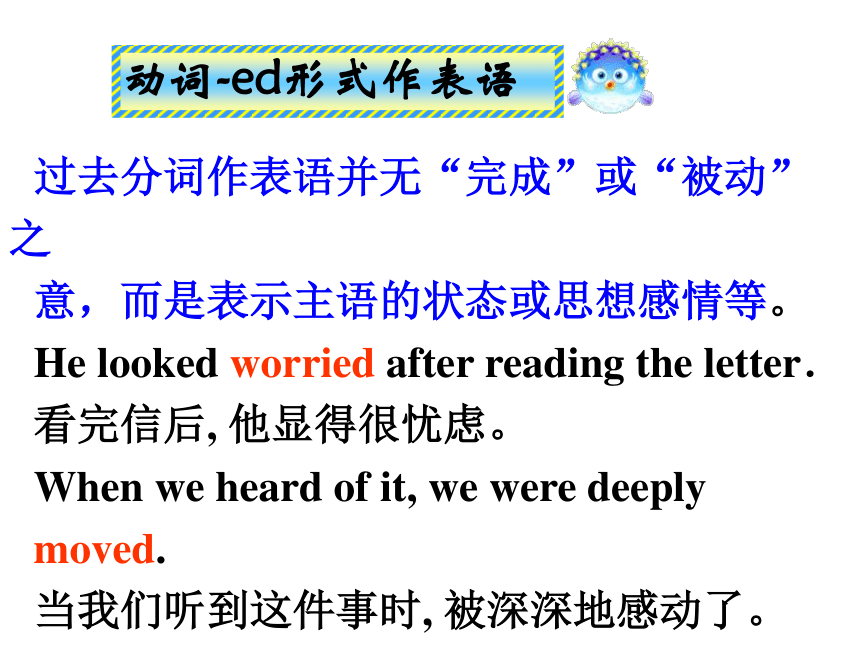
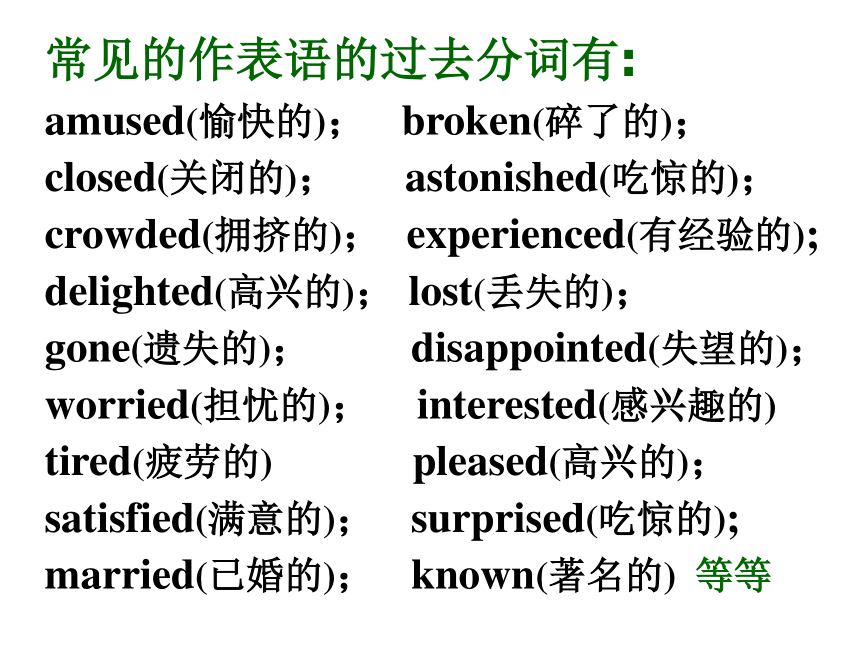
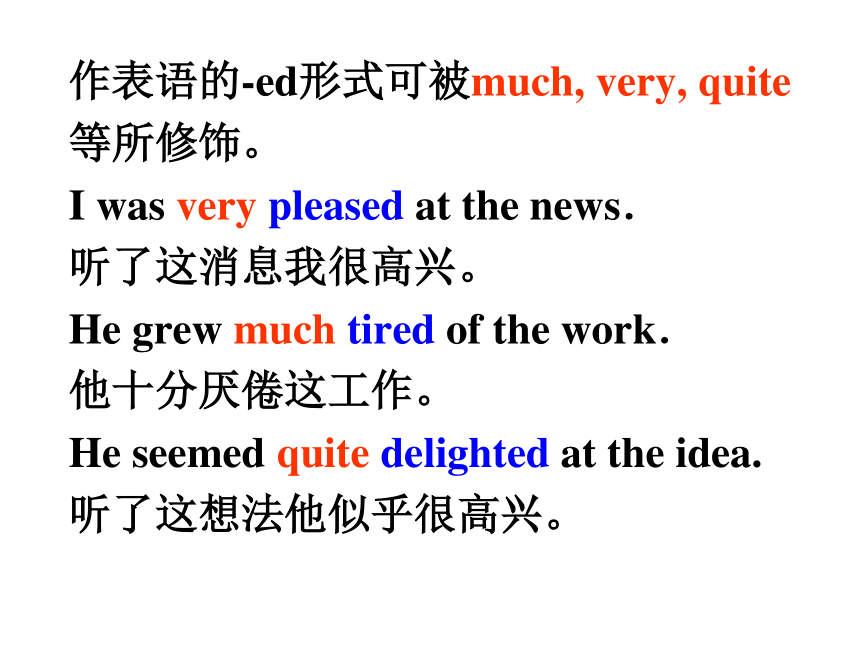
文档简介
课件37张PPT。 Revise
the Past ParticipleUnit 3 GrammarLook at the excited boy!
So many thousands of terrified people
died. Look at the sentences and find the use of the past participle.Everyone present was very inspired at
his speech.
You seem frightened. We found everything around changed.
The readers wished the serial story
continued. 定语表语宾补本单元我们学习
过去分词作定语、表语和宾语补足语。基本形式和意义动词的-ed形式,是动词的一种非限定形式。动词的-ed形式兼有动词、副词和形容词的特征,可以带宾语或受状语修饰。动词的-ed形式和宾语或状语一起构成-ed分词短语。动词-ed形式的基本形式是“动词+-ed”,但也有不规则的形式。The Past Participle过去分词作定语往往与被修饰的词靠得很紧, 渐渐地成为一个复合词。这种分词叫分词形容词 (the Participle Adjective), 实际上相当于一个单纯的形容词, 除表示“完成”的动作之外, 还表示“被动”的意义。
spoken English (英语口语);
iced beer (冰冻啤酒);cooked food (熟食);
fried chips (炸土豆条);动词-ed形式作定语 但要注意不及物动词的过去分词常表示“完成”的动作, 而不表示“被动”意义。boiled water(开水); fallen leaves(落叶)
the risen sun(升起的太阳) 1. The tall man is a returned student.
高个子的那个人是个归国留学生。
2. My parents are both retired teachers.
我的父母都是退休教师。 (1)前置定语
单个的动词-ed形式,一般放在被修饰
的名词的前面, 作前置定语。
The excited people rushed into the
building.
激动的人们冲进大楼。
(=the people who were excited)
Lost time can never be found again.
虚度的时光, 无法挽回。
(=time which is lost) (2)后置定语
①少数单个动词的-ed形式, 如left等,
只能作后置定语。
1. Everything used should be marked.
所有用过的东西应该做好标记。
2. Among the invited were some ladies.
被邀请的人中, 有些是女士。
3. The books left are for my students.
剩下的书是给我的学生的。 ② 动词-ed形式短语作定语时,通常要放在被修饰的名词的后面,在意思上相当于一个定语从句。
1. Is there anything planned for tonight?
今晚有什么活动吗?
(=that has been planned for tonight)
2. The meeting, attended by a lot of
people, was a success.
这次会议有很多人出席, 开得很成功。
(=which was attended by a lot of people) 过去分词作表语并无“完成”或“被动”之
意,而是表示主语的状态或思想感情等。
He looked worried after reading the letter.
看完信后, 他显得很忧虑。
When we heard of it, we were deeply
moved.
当我们听到这件事时, 被深深地感动了。动词-ed形式作表语 常见的作表语的过去分词有:
amused(愉快的); broken(碎了的);closed(关闭的); astonished(吃惊的);crowded(拥挤的); experienced(有经验的); delighted(高兴的); lost(丢失的);
gone(遗失的); disappointed(失望的);worried(担忧的); interested(感兴趣的) tired(疲劳的) pleased(高兴的);satisfied(满意的); surprised(吃惊的); married(已婚的); known(著名的) 等等 作表语的-ed形式可被much, very, quite
等所修饰。
I was very pleased at the news.
听了这消息我很高兴。
He grew much tired of the work.
他十分厌倦这工作。
He seemed quite delighted at the idea.
听了这想法他似乎很高兴。 动词-ed形式作宾语补足语 能用作宾语补足语的过去分词一般都是及物动词,表示被动意义或已完成意义,有时候两者兼而有之。作宾语补足语的过去分词与宾语有逻辑上的动宾关系,即宾语是过去分词动作的对象。My grandfather had his old house rebuilt.
我爷爷找人重修了一下他的旧房子。动词的-ed形式可以在“主语+谓语+宾语+宾语补足语”句型中充当宾语补足语。在这一结构中, 动词-ed形式和它前面的宾语构成逻辑上的被动关系。如果这种句子改为被动语态,原来的宾语补足语变成了主语补足语。动词-ed形式作宾语补足语的基本用法1. I must get my bike repaired.
我必须请人修理自行车。
(宾语补足语)
2. The girl was found beaten black and
blue.
人们发现那女孩被打得青一块紫一块。
(主语补足语) (1)动词-ed形式可作表示感觉和心理状态的动词的宾语补足语,这类动词包括see, hear, watch, notice, feel, find, think, suppose, consider等。We thought the game lost.
我们认为球赛输了。
She felt a great weight taken off her mind.
她觉得心里轻松了些。(2) 动词-ed形式可作使役动词的宾语补
足语, 这类动词包括make, get, have,
keep, leave, hold等。
I have my hair cut once a month.
我每个月理一次发。
He was trying to make himself
understood.
他正努力使别人听懂自己。① (请人)把某事做完。
She had her house repaired.
她请人把屋子修好了。
Where did you have your hair cut?
你在哪儿理的发? “have+宾语+done”结构有三个含义: ② 遭遇某种意外情况。
He had his hat blown away on his way
home.
在回家的路上他的帽子被吹掉了。
She had her wallet stolen yesterday.
昨天她的钱包被偷了。 ③ 完成某事 (自己也可能参与)。
I have had all my spelling mistakes
corrected.
我把所有的拼写错误都改正了。
He has had one thousand yuan saved
this year.
他今年已存了1000元。 (3) 动词-ed形式可作表示希望、要求、命
令等动词的宾语补足语,这类动词包括
like, want, wish, expect, order等”这一类
动词的后面作宾语补足语。
He won’t like such questions discussed
at the meeting.
他不喜欢在会议上讨论这样的问题。
The students wish the TV serial plays
continued.
学生们希望电视连续剧继续播下去。(4) 过去分词用在“with+宾语+宾补”这一结构中, 过去分词与宾语之间是动宾关系。
With many brightly colored flowers
planted around the building, his house
looks like a beautiful garden.
周围种了许多色彩鲜艳的花, 他的房子看上就像一座漂亮的花园。 1. From the dates ____ on the gold coin,
we decided that it was made five
hundred years ago.
A. marking
B. marked
C. to be marked
D. having been markedExercises 2. It was so large a room that a
hundred people looked ____ in it.
A. losing B. lost
C. to lose D. having lost Laws that punish parents for their
little children’s actions against the
laws get parents ____.
A. worried B. to worry
C. worrying D. worry 4. She was glad to see her child well
____ care of.
A. take B. to be taken
C. taken D. taking5. Friendship is like money easier
made than ____.
A. kept B. to be kept
C. to keeping D. being kept 6. With ____ leaves ____ in the earth
every year, the soil becomes richer
and richer.
A. falling; burying
B. fallen; buried
C. fallen; burying
D. falling; buried 7. Don’t use words, expressions or
phrases ____ only to people with
specific knowledge.
A. being known
B. having been known
C. to be known
D. known 8. John rushed out in a hurry, ____
the door ____.
A. leaving; unlocked
B. leaving; unlocking
C. left; unlocking
D. to leave; unlocking 9. The girl ____ forward to buying a
new gold watch.
A. referred to look
B. referred to looking
C. referred to looks
D. referring to looks 10. The disc, digitally ____ in the
studio, sounded fantastic at the
party that night.
A. recorded
B. recording
C. to be recorded
D. having recorded 11. ____ with the size of the whole
earth, the biggest ocean does not
seem big at all.
A. Compare
B. When comparing
C. Comparing
D. When compared 选择恰当的非谓语动词填空
1. John Snow told the story about the _________ (astonish) people in Broad Street.
2. Some of the people _______ (invite) to the party couldn’t come.
3. There is a car _______ (park) outside the house. astonishedinvitedparked4. The experience _______ (gain) will be of
great value to us.
5. These seats are _______ (reserve) for you.
6. The library is ______ (close) on weekends.
7. Don’t drink the _______ (pollute) water.
8. The ________ (worry) mother looked at
her________ (worry) son, looking
_______(worry). gainedreservedclosedpollutedworriedworryingworried 单句改错
1. The foreigner tried his best to make his point be understood.
2. They found a piece of rope with one end tying in a circle.
3. Mark got his hands to be burnt in the accident.
4. They both spent the night locking in the room. tying → tiedlocking → locked去掉 be去掉 to be 5. How would you like the rent to pay, in cash or by cheque?
6. What kept you so exciting?
7. You should speak loudly enough to make yourself hear.
8. I noticed the traffic holding up after a bad accident.to pay → paidexciting → excitedhear → heardholding →heldHomeworkFinish the exercises on
grammar in this unit.
2. Preview the reading
materials in Using
Language.Thank you.
the Past ParticipleUnit 3 GrammarLook at the excited boy!
So many thousands of terrified people
died. Look at the sentences and find the use of the past participle.Everyone present was very inspired at
his speech.
You seem frightened. We found everything around changed.
The readers wished the serial story
continued. 定语表语宾补本单元我们学习
过去分词作定语、表语和宾语补足语。基本形式和意义动词的-ed形式,是动词的一种非限定形式。动词的-ed形式兼有动词、副词和形容词的特征,可以带宾语或受状语修饰。动词的-ed形式和宾语或状语一起构成-ed分词短语。动词-ed形式的基本形式是“动词+-ed”,但也有不规则的形式。The Past Participle过去分词作定语往往与被修饰的词靠得很紧, 渐渐地成为一个复合词。这种分词叫分词形容词 (the Participle Adjective), 实际上相当于一个单纯的形容词, 除表示“完成”的动作之外, 还表示“被动”的意义。
spoken English (英语口语);
iced beer (冰冻啤酒);cooked food (熟食);
fried chips (炸土豆条);动词-ed形式作定语 但要注意不及物动词的过去分词常表示“完成”的动作, 而不表示“被动”意义。boiled water(开水); fallen leaves(落叶)
the risen sun(升起的太阳) 1. The tall man is a returned student.
高个子的那个人是个归国留学生。
2. My parents are both retired teachers.
我的父母都是退休教师。 (1)前置定语
单个的动词-ed形式,一般放在被修饰
的名词的前面, 作前置定语。
The excited people rushed into the
building.
激动的人们冲进大楼。
(=the people who were excited)
Lost time can never be found again.
虚度的时光, 无法挽回。
(=time which is lost) (2)后置定语
①少数单个动词的-ed形式, 如left等,
只能作后置定语。
1. Everything used should be marked.
所有用过的东西应该做好标记。
2. Among the invited were some ladies.
被邀请的人中, 有些是女士。
3. The books left are for my students.
剩下的书是给我的学生的。 ② 动词-ed形式短语作定语时,通常要放在被修饰的名词的后面,在意思上相当于一个定语从句。
1. Is there anything planned for tonight?
今晚有什么活动吗?
(=that has been planned for tonight)
2. The meeting, attended by a lot of
people, was a success.
这次会议有很多人出席, 开得很成功。
(=which was attended by a lot of people) 过去分词作表语并无“完成”或“被动”之
意,而是表示主语的状态或思想感情等。
He looked worried after reading the letter.
看完信后, 他显得很忧虑。
When we heard of it, we were deeply
moved.
当我们听到这件事时, 被深深地感动了。动词-ed形式作表语 常见的作表语的过去分词有:
amused(愉快的); broken(碎了的);closed(关闭的); astonished(吃惊的);crowded(拥挤的); experienced(有经验的); delighted(高兴的); lost(丢失的);
gone(遗失的); disappointed(失望的);worried(担忧的); interested(感兴趣的) tired(疲劳的) pleased(高兴的);satisfied(满意的); surprised(吃惊的); married(已婚的); known(著名的) 等等 作表语的-ed形式可被much, very, quite
等所修饰。
I was very pleased at the news.
听了这消息我很高兴。
He grew much tired of the work.
他十分厌倦这工作。
He seemed quite delighted at the idea.
听了这想法他似乎很高兴。 动词-ed形式作宾语补足语 能用作宾语补足语的过去分词一般都是及物动词,表示被动意义或已完成意义,有时候两者兼而有之。作宾语补足语的过去分词与宾语有逻辑上的动宾关系,即宾语是过去分词动作的对象。My grandfather had his old house rebuilt.
我爷爷找人重修了一下他的旧房子。动词的-ed形式可以在“主语+谓语+宾语+宾语补足语”句型中充当宾语补足语。在这一结构中, 动词-ed形式和它前面的宾语构成逻辑上的被动关系。如果这种句子改为被动语态,原来的宾语补足语变成了主语补足语。动词-ed形式作宾语补足语的基本用法1. I must get my bike repaired.
我必须请人修理自行车。
(宾语补足语)
2. The girl was found beaten black and
blue.
人们发现那女孩被打得青一块紫一块。
(主语补足语) (1)动词-ed形式可作表示感觉和心理状态的动词的宾语补足语,这类动词包括see, hear, watch, notice, feel, find, think, suppose, consider等。We thought the game lost.
我们认为球赛输了。
She felt a great weight taken off her mind.
她觉得心里轻松了些。(2) 动词-ed形式可作使役动词的宾语补
足语, 这类动词包括make, get, have,
keep, leave, hold等。
I have my hair cut once a month.
我每个月理一次发。
He was trying to make himself
understood.
他正努力使别人听懂自己。① (请人)把某事做完。
She had her house repaired.
她请人把屋子修好了。
Where did you have your hair cut?
你在哪儿理的发? “have+宾语+done”结构有三个含义: ② 遭遇某种意外情况。
He had his hat blown away on his way
home.
在回家的路上他的帽子被吹掉了。
She had her wallet stolen yesterday.
昨天她的钱包被偷了。 ③ 完成某事 (自己也可能参与)。
I have had all my spelling mistakes
corrected.
我把所有的拼写错误都改正了。
He has had one thousand yuan saved
this year.
他今年已存了1000元。 (3) 动词-ed形式可作表示希望、要求、命
令等动词的宾语补足语,这类动词包括
like, want, wish, expect, order等”这一类
动词的后面作宾语补足语。
He won’t like such questions discussed
at the meeting.
他不喜欢在会议上讨论这样的问题。
The students wish the TV serial plays
continued.
学生们希望电视连续剧继续播下去。(4) 过去分词用在“with+宾语+宾补”这一结构中, 过去分词与宾语之间是动宾关系。
With many brightly colored flowers
planted around the building, his house
looks like a beautiful garden.
周围种了许多色彩鲜艳的花, 他的房子看上就像一座漂亮的花园。 1. From the dates ____ on the gold coin,
we decided that it was made five
hundred years ago.
A. marking
B. marked
C. to be marked
D. having been markedExercises 2. It was so large a room that a
hundred people looked ____ in it.
A. losing B. lost
C. to lose D. having lost Laws that punish parents for their
little children’s actions against the
laws get parents ____.
A. worried B. to worry
C. worrying D. worry 4. She was glad to see her child well
____ care of.
A. take B. to be taken
C. taken D. taking5. Friendship is like money easier
made than ____.
A. kept B. to be kept
C. to keeping D. being kept 6. With ____ leaves ____ in the earth
every year, the soil becomes richer
and richer.
A. falling; burying
B. fallen; buried
C. fallen; burying
D. falling; buried 7. Don’t use words, expressions or
phrases ____ only to people with
specific knowledge.
A. being known
B. having been known
C. to be known
D. known 8. John rushed out in a hurry, ____
the door ____.
A. leaving; unlocked
B. leaving; unlocking
C. left; unlocking
D. to leave; unlocking 9. The girl ____ forward to buying a
new gold watch.
A. referred to look
B. referred to looking
C. referred to looks
D. referring to looks 10. The disc, digitally ____ in the
studio, sounded fantastic at the
party that night.
A. recorded
B. recording
C. to be recorded
D. having recorded 11. ____ with the size of the whole
earth, the biggest ocean does not
seem big at all.
A. Compare
B. When comparing
C. Comparing
D. When compared 选择恰当的非谓语动词填空
1. John Snow told the story about the _________ (astonish) people in Broad Street.
2. Some of the people _______ (invite) to the party couldn’t come.
3. There is a car _______ (park) outside the house. astonishedinvitedparked4. The experience _______ (gain) will be of
great value to us.
5. These seats are _______ (reserve) for you.
6. The library is ______ (close) on weekends.
7. Don’t drink the _______ (pollute) water.
8. The ________ (worry) mother looked at
her________ (worry) son, looking
_______(worry). gainedreservedclosedpollutedworriedworryingworried 单句改错
1. The foreigner tried his best to make his point be understood.
2. They found a piece of rope with one end tying in a circle.
3. Mark got his hands to be burnt in the accident.
4. They both spent the night locking in the room. tying → tiedlocking → locked去掉 be去掉 to be 5. How would you like the rent to pay, in cash or by cheque?
6. What kept you so exciting?
7. You should speak loudly enough to make yourself hear.
8. I noticed the traffic holding up after a bad accident.to pay → paidexciting → excitedhear → heardholding →heldHomeworkFinish the exercises on
grammar in this unit.
2. Preview the reading
materials in Using
Language.Thank you.
